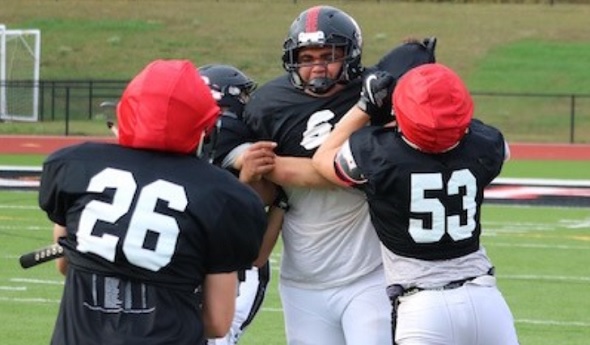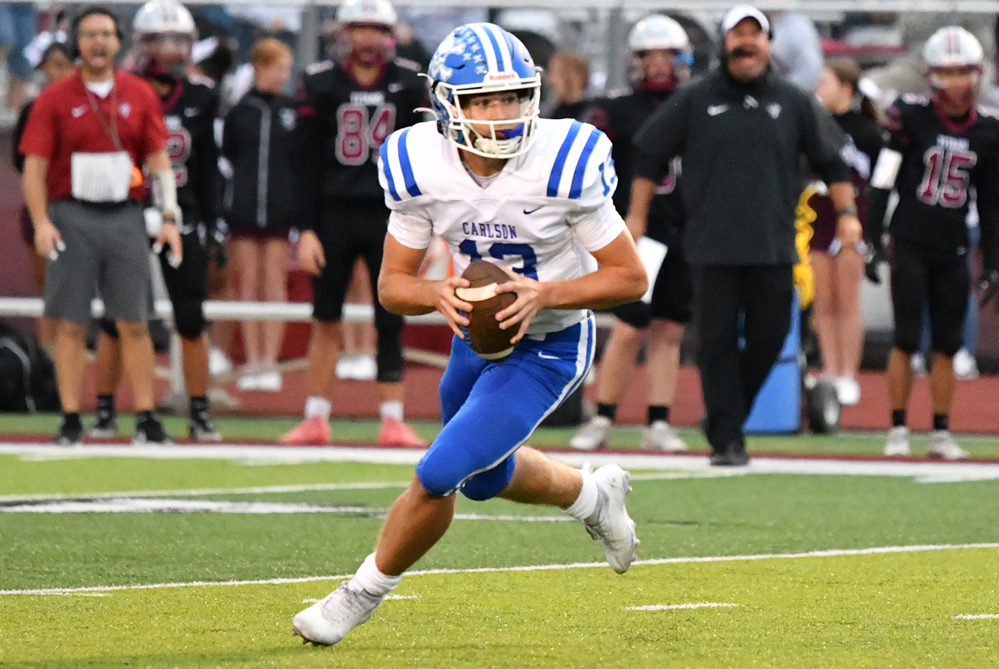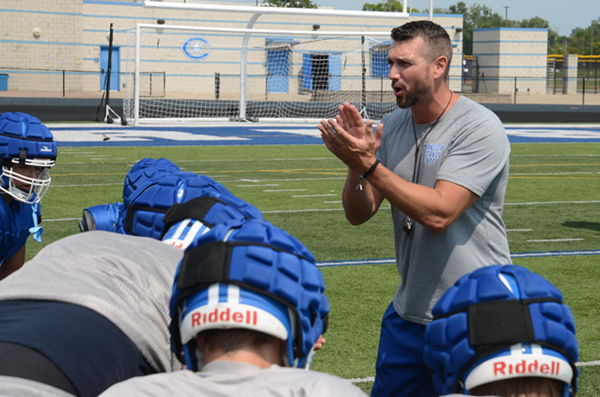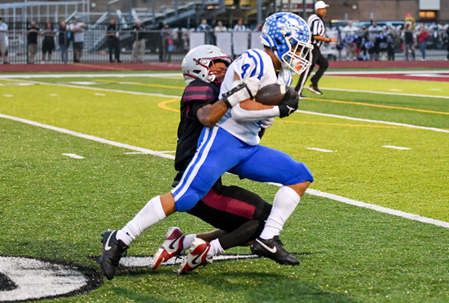
Ford Swaps Frustration for Focus
October 24, 2017
By Tim Robinson
Special for Second Half
Midway through the 2016 season, Marcus Ford was frustrated.
 He was on the Pinckney football team, but not playing much.
He was on the Pinckney football team, but not playing much.
A big part of that was due to his size — 6-foot-5 and over 400 pounds — but then-defensive coordinator Rod Beaton sensed there was more.
“We feel that we coach very hard,” said Beaton, now Pinckney’s head coach. “We’re very aggressive (on the varsity), and sometimes it’s an adjustment for juniors to understand that when they come out here, there’s expectations.
“There were a couple times where Marcus was questioning … whether football was for him.”
“I didn’t want to be there,” Ford said. “I thought, ‘This is stupid. Why am I here so late?’”
And then came a change.
“It came to a point where he went home and took a day off to re-gather himself,” Beaton said. “Marcus came back and he said to me, ‘Coach, I really want to be a part of things here.’”
And Ford did more than that.
He grew from a young man who bristled when his coaches pointed out mistakes to one who doesn’t react as if it were a personal attack, from an overweight kid who admits he was on his way to weighing 600 pounds to a big kid who is a key part of Livingston County’s most successful football team as a senior.
He rarely comes out of games, his coach says, and the quiet giant who rarely interacted with his teammates has transformed into a happy, smiling kid who dishes out and takes teasing from them.
It’s a story of transformation that only football could have done for Marcus Ford, who couldn’t play youth football because of his size and whose options for high school athletics seemed limited to football for the same reason.
“I may sound a little clichéd and corny,” Beaton said, “but I think this is why every single coach in America coaches football, to watch the development of a young man, from freshman to sophomore to junior and to see what football has done for him.”
How did Ford do it?
He turned his mental approach 180 degrees and made drastic changes to his diet and work ethic.
One clue came in looking at Pinckney’s roster from 2016 compared to 2017. Last year, Ford was listed at 380, which was about 40 pounds less than his actual weight.
This year, he’s listed at 405, which is a dozen pounds more than what he weighs now.
Last year, he played mostly in mop-up roles.
This year, he is a starter on defense, regularly occupying two blockers at a time, which in turn frees linebackers Cauy Hendee and Levi Collins to make tackles.
“I can play a lot longer,” he said. “I was tired when we were out there, but we don’t believe in the word ‘tired.’ We prefer ‘winded.’ We just need to catch our breath. So I get ‘winded’ a lot less.”
The first thing Marcus decided to change was his diet, and he got his cues by looking in the mirror.
“I didn’t like the muffin cap that was hanging down,” he said. “I didn’t like my stomach hanging over. ... I thought, ‘I don’t what to have a heart attack at age 25.’ I was doing ‘diets,’ per se, but eventually I thought, ‘This is stupid. Cut out pop and eat better,’ And I did.
“The only thing I would eat that was green was green beans, and they had to be made a certain way,” he said. “Now, I’m more like ‘this is somewhat appetizing. Let me try that.’ I don’t eat candy bars anymore. I don’t eat ice cream when my family does. I drink a lot less milk than I used to, and I drink more water.”
 Pinckney offensive coordinator Cody Patton noticed.
Pinckney offensive coordinator Cody Patton noticed.
“His mom came to me about getting a weight plan, and he stuck with it,” Patton said. “They can only do so much in the weight room. When they leave, there’s not much you can control what they put into their bodies.”
But Ford also changed his mindset about football and being coached.
“His first real commitment was ninth-grade high school football, and it was a big adjustment for him,” Beaton said. “We knew there would be days where he might be a little confrontational, there may be some days where he goes through the motions.”
But after that midseason meeting last year, Ford redoubled his efforts in practice and in the offseason.
The first hint that he was a different player came in June, when Ford earned the team’s first bone helmet sticker of the season for effort in a drill.
“It was our first pursuit drill,” Beaton said. “We go four downs, and those kids have to sprint. There’s no exception. Marcus stepped to his gap, made his reads, flew to the football and didn’t say a word, every single time. He did it four times in a row. It really set the stage. I could tell he was wanting do to things right this year.
“When you see a 6-5, 400-pound kid moving with effort and tenacity, you sit there and go, ‘That young man can help us.’”
And so he has.
As a result, Marcus Ford is part of a Pinckney defense that has lifted the Pirates to an 8-1 regular-season record and shared Southeastern Conference White championship. He has transformed from a player who had little stamina to one who can go from opening kickoff to final horn.
“He can play a whole football game,” Beaton said. “He can go through a whole practice. One of the challenges we were talking about in the offseason is he has to put his body and mind in a position to not come off the field.”
That moment came on a warm night early in the season.
“We were in a huddle at Chelsea, and it was late,” Beaton recalled. “He’s drenched in sweat, and I said, ‘Marcus, you need a breather?’ And he said, ‘No, coach. I’m ready.’ That’s pretty cool.”
Asked his ideal weight, Ford said, “I would like to be at 250 if I could,” then laughs. His bone structure is such that at his height, he would be almost gaunt at 250. “I would settle for 340. That’s the dream within a dream goal.”
Next year, he plans to attend college.
“I want to go into bartending or being a head chef, or get a business degree,” he said. “One other choice is going to a police academy. As long as I can run a mile within 15 minutes, I should be good.”
There’s no reason, now, to think he couldn’t accomplish that.
He got his first sack against Dexter.
‘I grabbed him and rolled him over on top of me,” Marcus said. “I would have liked to have landed on him, but I got him down in the backfield. It’s good.”
And football now is fun.
“A lot more fun,” he said.
“Marcus made a concerted effort to our strength and agility program,” Beaton said. “It wasn’t two days at a time, then not be there five or six days. Marcus was there. He would stay after everyone had left and get some extra lifts in or do some extra work to make sure he was putting himself in a (good) position.
“He said, ‘Coach, I want to be your starting nose (tackle).’ The first day of June camp, he ran out to the nose tackle, and we haven’t looked back.”
PHOTO: (Top) A pair of Pinckney blockers try to contain nose tackle Marcus Ford during a practice this season. (Middle) Ford breaks free to get an arm on a ball carrier. (Photos by Tim Robinson.)

Carlson's 'Power-Spread' Piling Up Points Despite Missing Leading Rusher
By
Doug Donnelly
Special for MHSAA.com
October 2, 2024
In Johnny Cash’s song “One Piece at a Time,” the main character collects car parts over the years to build a one-of-a-kind automobile.
 At the end of the song, he’s asked what model it is. That’s where he runs into trouble.
At the end of the song, he’s asked what model it is. That’s where he runs into trouble.
“Well, it’s a ’49, ’50, ’51, ’52 …” Cash sings.
That automobile is a lot like the offense that has Gibraltar Carlson’s football team off to a 5-0 start.
“We pride ourselves in running the football here,” third-year head coach Jason Gendron said. “That is our identity. We play power football.”
That’s not the full story, however.
“We are multi-set, really,” Gendron said. “We have Wing-T principles, but we are a spread, Wing-T team that can go tight formations with two tight ends and three running backs. We also can go spread and run some run-pass option things. We also like to run counter off that.
“At the end of the day, power football is where we like to be. We can run that out of multiple sets. Everything we do is based off power.”
Marauders quarterback Joe Krolak agrees. Sort of.
“It’s power-spread,” Krolak said. “It’s hard to describe. We can go under center, or we can go spread.”
No matter what you call it, the Marauders’ offense is clicking in all gears. Carlson is averaging a two-point conversion shy of 50 points a game in their 5-0 start.
That Carlson is having success is not surprising or anything new. The Marauders have won four straight Downriver League championships and have made the playoffs seven years running. The surprising piece this season is they have done it without Division I college recruit Izaiah Wright, the junior running back who rushed for 1,965 yards and 31 touchdowns as a sophomore in leading Carlson to a 10-2 record.
Wright played in Week 1. But on the first offensive series of the game in Week 2, he went down with an ankle injury and hasn’t played since.
 “It’s been a slow recovery,” Gendron said. “He’s been week-to-week. He’s getting closer. I do think he’ll play again this year, but I don’t know if he will be 100 percent this year.”
“It’s been a slow recovery,” Gendron said. “He’s been week-to-week. He’s getting closer. I do think he’ll play again this year, but I don’t know if he will be 100 percent this year.”
In his place, the Marauders were sharing carries among multiple backs until last week when junior Avery Ortiz got the full workload. He responded with 200 yards rushing and multiple touchdowns.
Gendron said he and the Carlson coaches saw the potential in Ortiz.
“Avery has been the running back who has emerged,” Gendron said. “We feel Avery is one of the best backs in our conference and southeast Michigan.”
Ortiz has been Wright’s backup for a couple of seasons. Last year Gendron asked Ortiz about changing positions to get him on the field, and he started playing safety. This season, with Wright out, Ortiz found himself on the offensive side of the ball again.
“He has great vision and is really good on his cuts,” Gendron said. “Avery is a running back at heart. He’s always wanted to be the running back here, but you have a kid in front of him who is a Division I player who beat him out. That’s just the way it goes. At least he was humble enough to accept that and find another place to play. For him to get that back, seize the moment and run with it, is the credit to the type of kid he is.”
Krolak said the offense hasn’t skipped a beat with Ortiz as the featured back.
“Everybody knows in this program it’s next man up,” Krolak said. “We have a lot of athletes in this program who can do the same things he can do. Avery has really stepped up big. He’s looking phenomenal. He’s a great running back and has carried us through this.”
Gendron called Krolak the team’s first-half MVP. Krolak has completed 44 of 62 passes for 669 yards and six touchdowns and rushed for another 406 yards and nine touchdowns.
“Joe is a very dangerous runner and has gotten better at throwing,” Gendron said. “He’s a dual-threat quarterback. You can’t just key on Izaiah or Avery. You have to have eyes on Joe. He’s been the player of the year for us without question. He’s leading us and doing everything I’ve asked him to do at the position. He’s having a great year.”
Krolak, a senior, said he was ready for his number to be called more with Wright out.
“I knew I would get the ball more,” Krolak said. “Coach told me I was going to run the ball more and throw it around, and I was completely ready for it.”
 Carlson has several more weapons, including tight end Drew Sikora and receivers Brendan Stanley and Landon Vida. Everything starts up front, however.
Carlson has several more weapons, including tight end Drew Sikora and receivers Brendan Stanley and Landon Vida. Everything starts up front, however.
“I tell our offensive line that they are the most important position group on the field, both our offensive and defensive lines,” Gendron said. “They have bought in and embraced that and the fact that we want to be a power, smash-mouth football team.”
Carlson’s been pretty good on defense, too, giving up just six touchdowns all season.
Gendron is a Monroe Jefferson graduate who played for Marc Cisco, who retired after 47 years coaching the Bears. That’s where Gendron learned the fundamentals of the game and about power football.
“It works,” Gendron said. “It worked back then for Marc, and it works for us. It’s good football. I believe in it. The kids buy into it. There’s nothing better from an offensive standpoint when you can get three yards at will and you can call the play again and it works.”
The current offense is a mix of Gendron’s years playing at Jefferson and schematic strategies incorporated by Dan Kalbfleisch, the Carlson athletic director and assistant football coach.
“We’ve blended Dan’s experience with his spread concepts and the things I value about offensive football – the ground and pound, power football concepts – into one offense. Dan brings the pre-snap, tempo, no-huddle offense with motion and getting guys into space. That’s what you see. We both believe in running the football.”
Carlson has some tough games ahead, but Gendron is pleased with how the season is shaping up. With a little luck, they might get Wright back in time for a playoff run.
“We are on schedule right now,” he said. “Our guys have done what they need to do at this point. We take things one week at a time. Trenton is on the clock right now.”
 Doug Donnelly has served as a sports and news reporter and city editor over 25 years, writing for the Daily Chief-Union in Upper Sandusky, Ohio from 1992-1995, the Monroe Evening News from 1995-2012 and the Adrian Daily Telegram since 2013. He's also written a book on high school basketball in Monroe County and compiles record books for various schools in southeast Michigan. E-mail him at [email protected] with story ideas for Jackson, Washtenaw, Hillsdale, Lenawee and Monroe counties.
Doug Donnelly has served as a sports and news reporter and city editor over 25 years, writing for the Daily Chief-Union in Upper Sandusky, Ohio from 1992-1995, the Monroe Evening News from 1995-2012 and the Adrian Daily Telegram since 2013. He's also written a book on high school basketball in Monroe County and compiles record books for various schools in southeast Michigan. E-mail him at [email protected] with story ideas for Jackson, Washtenaw, Hillsdale, Lenawee and Monroe counties.
PHOTOS (Top) Gibraltar Carlson quarterback Joe Krolak considers his best option during last week’s win over Southgate Anderson. (Middle) Carlson coach Jason Gendron pumps up his team during a practice. (Below) The Marauders’ Avery Ortiz drags a defender downfield. (Game photos by Kim Britt; practice photo by Niles Kruger/Monroe News.)

